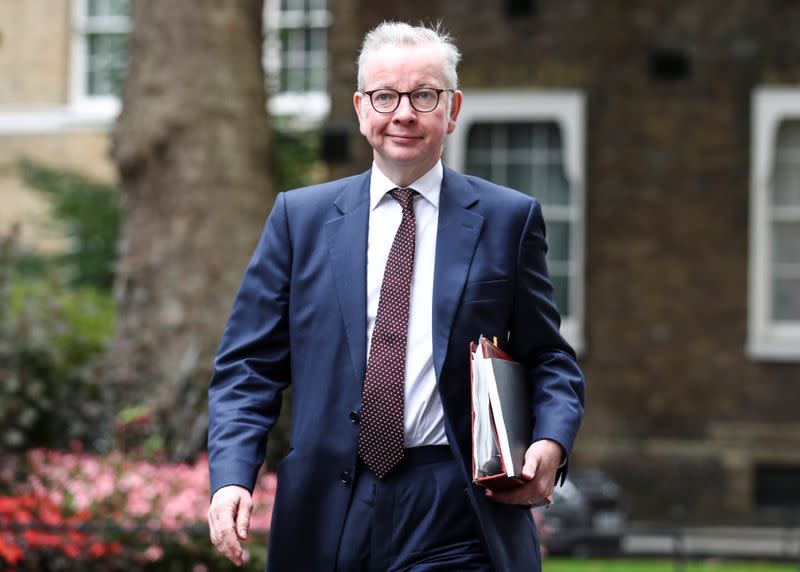EU takes action over UK's blow to Brexit bill
By Gabriela Baczynska and William James
BRUSSELS/LONDON (Reuters) - The European Union launched a legal case against the United Kingdom on Thursday for undercutting their earlier divorce deal and a senior UK minister said differences remained in talks on a post-Brexit trade agreement.
Controversy over the UK's new Internal Market Bill has thrown the tortuous Brexit process into a fresh crisis while disagreements over corporate subsidies, fisheries and ways to solve disputes are overshadowing parallel trade negotiations.
"We had invited our British friends to remove the problematic parts of their draft Internal Market Bill by the end of September," the head of the EU's executive Commission, Ursula von der Leyen said. "The deadline lapsed yesterday."
With London not budging, she said the Commission started a so-called infringement, an EU legal procedure against countries that violate the bloc's laws, while continuing to work towards implementing the divorce deal, or Withdrawal Agreement.
"We stand by our commitments," von der Leyen said.
London now has a month to reply to the Commission's formal letter of complaint and even more time to change tack before the Brussels-based executive can sue at the bloc's top court. The case could lead to hefty fines, but that takes years.
"It think it is a logical administrative next step given that this particular law has now passed so many stages in the UK parliament," Dutch Prime Minister Mark Rutte said on arriving at talks with his EU peers.
The Internal Market Bill has passed the UK's lower chamber of parliament and now awaits debate in the House of Lords.
Sterling seesawed following the announcement, which came as the EU's 27 national leaders began a two-day meeting in Brussels that will also assess progress in the negotiations over the new trade agreement, which are reaching a critical point.
The currency slipped 0.6% against the euro and the dollar on a Reuters report that the sides have failed to close the gap. It then gained 1% on reported optimism over the trade talks from UK officials before falling back to 0.2% down after an EU official said the optimism was unfounded.
"We're not seeing any sign yet that landing zones are in sight, whether on the level playing field or fish," said the official, involved in the negotiations with the UK.
NO MOVEMENT
The United Kingdom says its nations cannot trade freely with each other after Brexit if there is no new trade deal with the EU without breaking the divorce deal provisions on the sensitive Irish border. A government spokesman said on Thursday it had made that clear.
The EU is adamant, however, that it would not implement any new UK deal as long as London undermines the divorce treaty.
"It is the result of long EU-UK negotiations & the only way to protect Good Friday Agreement, guaranteeing peace and stability on island of Ireland," the EU's chief Brexit negotiator Michel Barnier wrote on Twitter.
Senior UK minister Michael Gove said earlier "differences still remain" between Britain and EU in trade discussions, but that London would work hard for a deal.
EU officials and diplomatic sources told Reuters negotiators had failed to close the gap on the key issue of state aid, where the EU wants London to agree rules compatible with its own.
The bloc wants an independent British regulator to decide on state aid there, as well as a new EU-UK dispute settling mechanism that would create a new Joint Committee and an Arbitration Panel to adjudicate.
Should one side fail to honour decisions made through that process, the Arbitration Panel could impose fines and the other side could retaliate by hitting bilateral trade elsewhere.
Britain wants control of its subsidy regime and says state aid clauses are not usually put in free trade agreements. "We have proposed appropriate dispute settlement procedures, including arbitration where it is precedented," a UK government spokesman said.
With time available until the end-year deadline running out, pressure is growing to put a deal in place to avoid damaging an estimated trillion euros of annual trade.
This week's ninth negotiating round - due to finish early on Friday - is the last scheduled so far and EU leaders will again assess progress on Oct.15-16.
They could switch to contingency planning for the most damaging economic split without new arrangements or approve a final, make-or-break negotiation known as the "tunnel".
The EU says a deal must be at hand by early November to give the European Parliament and some national parliaments enough time to ratify it before Britain's post-Brexit transition expires at the end of the year.
(Additional reporting by Marine Strauss, Philip Blenkinsop and John Chalmers in Brussels, David Milliken, Elizabeth Piper and Guy Faulconbridge in London, Writing by Gabriela Baczynska, Editing by Tomasz Janowski and Philippa Fletcher)












